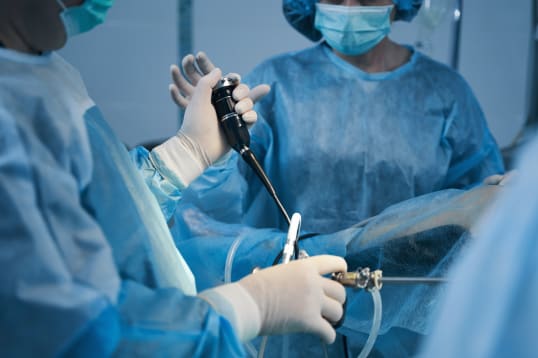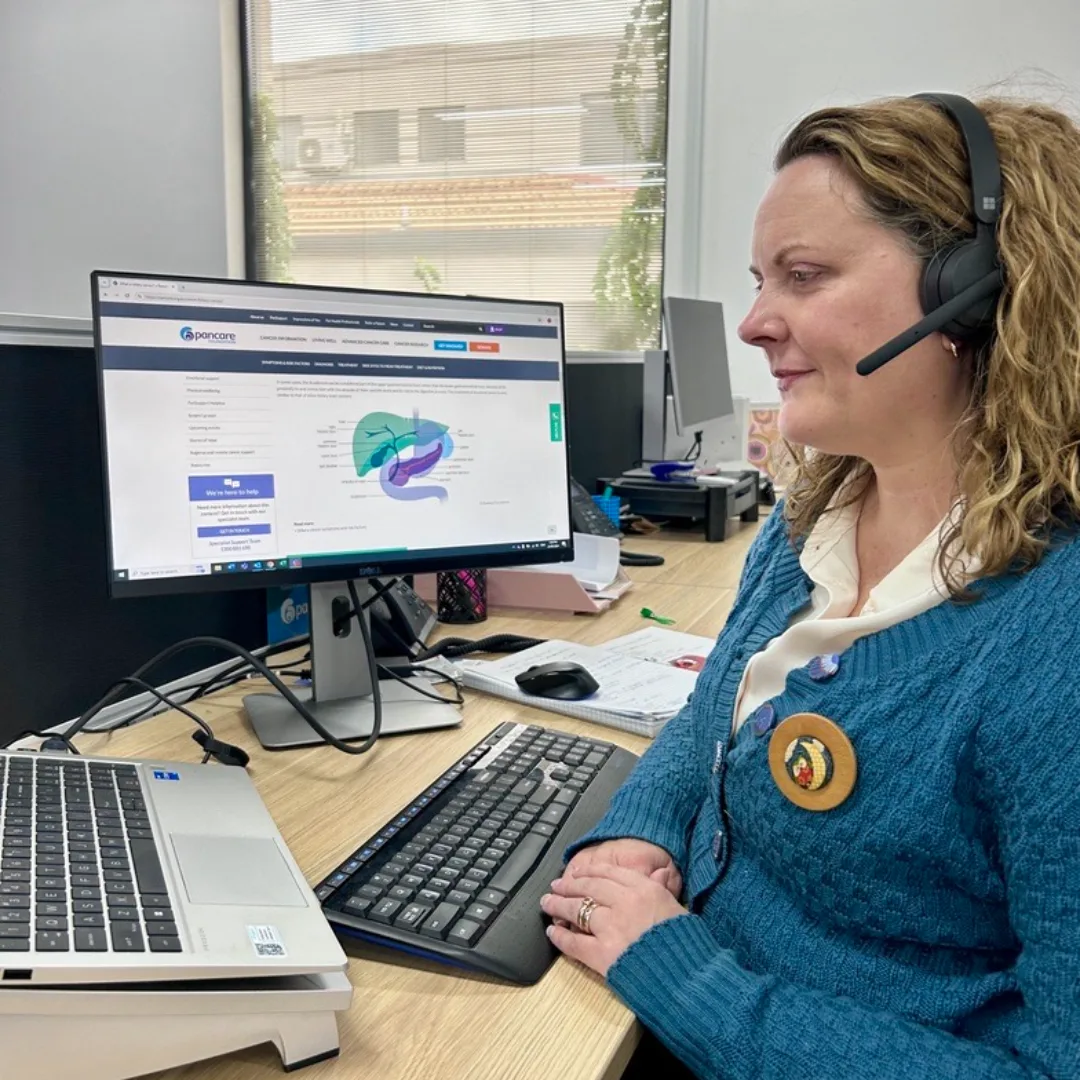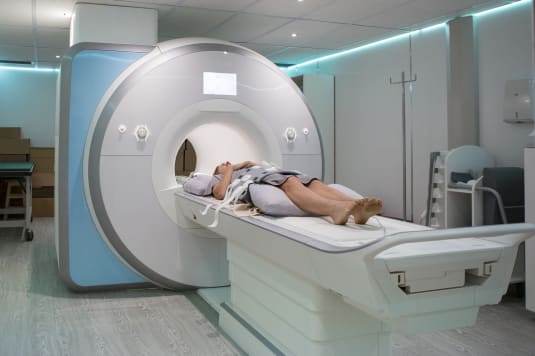Tests and diagnosis
You might need to have several tests when you are being investigated for pancreatic cancer. These tests help your doctors understand if there is cancer in your pancreas, what type of cancer it is and if it has spread. This information helps them plan the best treatment for you.
Waiting for tests and results can be stressful. This section explains the tests you might have, what staging means, genetic testing, and what happens when you get your diagnosis.
Tests for pancreatic cancer
Diagnosing pancreatic cancer can be hard and often needs several different tests. Your specialist will choose the best tests for you. You may not need all the tests described here.
Blood Tests
Blood tests can check:
- your blood count
- how well your liver and kidneys are working
- tumour markers – chemical substances produced by cancers that show up in the bloodstream.
For example, CA19-9 is a tumour marker linked to pancreatic cancer. But other health problems can also raise this marker, and some people with pancreatic cancer have normal levels. So, this test alone can't tell you if you have pancreatic cancer.
Scans
Several types of scans may be used to look at your pancreas and nearby organs.
- An ultrasound uses sound waves to make pictures of your abdomen (tummy). A probe is moved over your abdomen and shows your liver, pancreas, gallbladder and bile ducts.
- A Computed Tomography (CT) scan uses X-rays to make 3D pictures of your pancreas and nearby organs. This scan usually also includes your chest and pelvis to check if cancer has spread.
- A Magnetic Resonance Imaging (MRI) scan uses magnets and radio waves to make detailed pictures of your pancreas and the soft tissue nearby.
- A Magnetic Resonance Cholangio-Pancreatography (MRCP) scan is a special type of MRI scan. It can make clearer pictures of the bile and pancreatic ducts and help see any blockages.
- A Positron Emission Tomography (PET) scan uses a small amount of radioactive substance is put into a vein. It can help to find very small areas of cancer cells. You may have a PET scan combined with a CT scan.
Special procedures
Some tests for pancreatic cancer use special equipment.
- During an Endoscopic Ultrasound (EUS), a thin, bendy tube with an ultrasound probe is passed through your mouth into your stomach. This gives close-up pictures of your pancreas. It can also be used to take a biopsy, which is a small tissue sample.
- An Endoscopic Retrograde Cholangio-Pancreatography (ERCP) is similar to EUS and uses a bendy tube through your mouth. A thin tube is guided into the bile and/or pancreatic ducts. Special dye is put in and X-ray pictures are taken to show any blockages. During this procedure, a stent (small tube) can be put in to keep blocked ducts open.
- A laparoscopy is a small operation done whilst you're asleep under general anaesthetic. A long tube with a camera is put in through small cuts in your tummy. This lets doctors see if cancer has spread. Small tissue samples (biopsies) can also be taken during this procedure.
- A biopsy means taking a small sample of pancreatic tissue to look at under a microscope. This shows if cancer cells are there.

A biopsy may be done:
- during an EUS, ERCP, or laparoscopy
- through your skin using a needle, guided by CT scan.
You might not need a biopsy if the plan is to remove the tumour with surgery straight away. But if surgery isn't planned at first, you'll need a biopsy before starting chemotherapy or joining a clinical trial.
Waiting for test results
Results should be ready within one week of having the tests. Waiting can be stressful. If your symptoms get worse while waiting, contact your doctor or go to an emergency department if needed.
Genetic testing
Genetic testing can provide important information about both why pancreatic cancer develops and how it might best be treated. There are two main types of genetic testing – one looks at the genes you were born with, and the other looks at the genes within the cancer itself.
Genetic testing for inherited gene changes
Pancreatic cancer is a genetic disease, meaning it is caused by changes in our DNA. Most cases occur by chance and are related to changes occurring to the DNA over a lifetime. However, 5% to 10% of cases are due to genetic changes that may have been inherited.
These inherited gene changes can be linked to genes such as BRCA1, BRCA2, PALB2, ATM, p16, and genes associated with Lynch syndrome.
Who is this testing for?
Your specialist may refer you for genetic counselling and testing if:
- there are multiple family members with pancreatic cancer
- you were diagnosed at a young age (under 50)
- there’s a family history of breast, ovarian, bowel, or melanoma
- you have a family history of chronic pancreatitis.
Testing is usually done with a blood or saliva sample. If a gene change is found, your medical team will discuss what this means for you and your family.
Genetic testing of tumours
Every pancreatic cancer tumour is unique. It is possible to test the tumour itself to see if there are any gene or protein changes within the cancer cells that is driving the cancer to grow. This is called comprehensive genomic profiling (CGP).
By testing for these specific genetic features of the cancer, your specialist may be able to:
- match you with targeted treatments designed to attack those specific features
- see if you're eligible for certain clinical trials
- give you more personalised treatment options.
Genetic testing may take several weeks or months for results. Not all pancreatic cancers will have genetic changes that can be targeted with treatment.
Your specialist will talk with you about whether genetic testing is right for your situation.
Staging pancreatic cancer
Once pancreatic cancer is found, your doctors need to work out how far the cancer has spread. This is called staging.
Staging helps your medical team:
- understand how much cancer there is in your body
- plan the best treatment
- predict how you may respond to treatment.
In most cases, the stage of a cancer is based on three factors:
- the location and size of the tumour (T)
- whether or not the cancer has spread to nearby lymph nodes (N)
- whether or not the cancer has spread to distant areas of the body, known as metastasis (M).
These combined factors are known as the TNM staging system.
Your doctor might also use a number between 1 and 4 to describe the stage of your cancer.
- Stage 1 means cancer is found only in the pancreas and has not spread
- Stage 2 means cancer has spread to nearby lymph nodes
- Stage 3 means cancer has spread to major blood vessels or more lymph nodes
- Stage 4 means cancer has spread to other parts of the body (known as advanced or metastatic cancer).
Sometimes staging can only be fully determined after surgery when the removed tissue is examined.
Can my cancer be removed?
In addition to staging the cancer, your doctors will also describe the cancer based on whether it can be removed with surgery.
Your cancer might be:
- resectable (or operable). This means it can be removed by surgery
- borderline resectable: This means the cancer partly involves major blood vessels. Surgery may be possible after chemotherapy to shrink the cancer.
- locally advanced: This means the cancer has grown around major blood vessels and cannot be removed.
- metastatic: This means the cancer has spread to other organs. At this stage, it cannot be removed with surgery.
Finding out you have pancreatic cancer
Being told you have pancreatic cancer is shocking and overwhelming. There is no ‘right’ way to feel – everyone reacts differently. You may feel:
- shock and disbelief
- fear and worry
- anger
- sadness
- numbness.
All of these reactions are normal.
A lot can happen quickly after diagnosis, and you might get lots of information. It's okay if you don't remember everything you're told or need information repeated.

What happens next
After your diagnosis, your medical team will finish any remaining tests that are needed. They will then talk to you about the treatment plan best suited to your situation.
Treatment should start within four weeks of diagnosis, depending on how urgent it is and what type of treatment is recommended.
Here are some questions that you may want to ask your medical team as you come to terms with your diagnosis and think about your treatment options.
- What type of pancreatic cancer do I have?
- Where in the pancreas is the cancer located?
- Has the cancer spread, and what stage is it?
- How does this stage affect my treatment options and outlook?
- What treatments are recommended for my situation?
- Can I get a second opinion?
- What is the goal of treatment? Is it to remove the cancer, slow its growth, or manage symptoms?
- What are the benefits and risks of each option?
- How likely is the treatment to work in my case?
- Are there other treatments I should consider (including clinical trials)?
- What happens if I decide not to have treatment?
Want to talk?
Speak to an upper GI cancer nurse or counsellor, we're here to provide you with the support you need. Support available to anyone impacted by upper gastrointestinal (GI) cancer. Monday to Friday, 9am-5pm.


